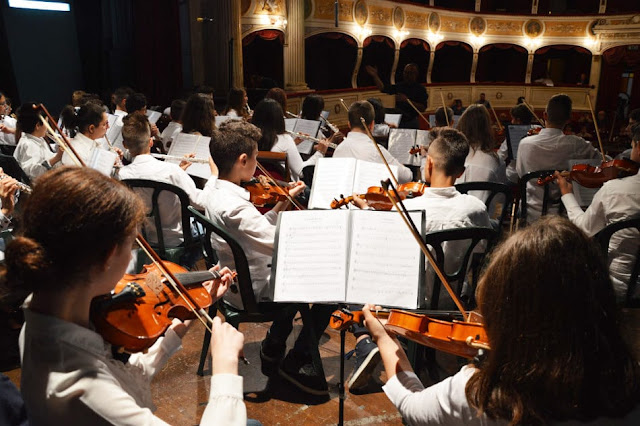Usually, when we think of religious orders, these things come to mind: a cloister, an abbey, a library, prayer in solitude, detachment from the world… All this in the cradle of a period defined as "dark" by historiography up to Romanticism: the Middle Ages . In this period the monks - especially the Benedictines of the various orders - were the custodians of Judeo-Christian but also classical culture, since thanks to their patient and meticulous transcriptions as scribes we have received almost all of the Greek and Latin works which we study today. Today we are grateful to them first of all for this. However, many do not know that many products - material and immaterial - that we consume and use every day, come from monks who, using their ingenuity nourished by a profound spirituality, invented them due to practical necessities. Personally, I find it amazing! Let's begin… The heavy plow Plows were a primary agri...
Have you ever played a musical instrument? Perhaps at school or attending private lessons? Though it might seem like a "light" and leisurely activity, studying music with an instrument is very challenging and demanding.
It's a continuous and inexhaustible stimulus that could last an entire lifetime! The ceaseless involvement required in musical participation may be the minor aspect that brings value to musical education, though it is often neglected in debates about the aim of music in school education. Indeed, in several studies (see, for example, Pitts, 2012), it is clearly shown that music learning—particularly learning to play an instrument—brings lifelong benefits even for those who no longer play: first, it improves listening capability and attention to details. And if you play in a musical group (a band, an orchestra...), you develop a better team spirit and team-working ability.
If you are thinking right now that you are "too old" to learn a musical instrument, know that it can be done at any age, also with excellent results. Maybe you have little free time, but your desire to play will give you stronger concentration when you can exercise.
And if you won't become the Jimi Hendrix of guitar or the Vladimir Horowitz of the piano, there are a huge amount of benefits for yourself that you should consider.
 |
| Vladimir Horowitz |
MOTOR ASPECTS
Anita Collins, an educator and researcher, underlines in a speech held on YouTube Ted Ed that playing music:stimulates some areas of the brain, particularly those responsible for audio-visual and motor functions; develops and improves breathing with a direct effect on body tissues, enhances rhythmic and coordination skills (particularly eye-hand).
LINGUISTIC ASPECTS
A scientific study published in Cerebral Cortex by some researchers at the University of South California proved that playing:
- Improves the ability to maintain concentration;
- Stimulates the development of some brain areas used for sound processing;
- Develops personal expression skills, promoting linguistic development and language perception;
- Helps to improve reading, writing, and comprehension ability, according to several studies
COGNITIVE ASPECTS
There's a phenomenon called the "Mozart effect." Due to this, listening to sonata KV 448 may cause a temporary increase in intellectual abilities, but this is only a myth. It's true, instead, that studying a piece of music involves facing many problems: techniques, memory, interpretation, personalization… So, a group of researchers published an article in Plus One in which they underline how some intellectual abilities are enhanced by studying music:
- Improved mathematical ability, because reading sheet music requires counting notes and their duration;
- Better attention to details;
- Better ability to memorize information;
- Vivid creativity;
- Greater aptitude for using strategic and planning skills;
- Refinement of the ability to recognize patterns and structures;
- Exercise of analytical reasoning and problem-solving skills;
- Helps to train better decision-making, increasing the brain areas responsible for it;
- Promotes the rational use of available time and the development of organizational skills.
SOCIAL AND PSYCHOLOGICAL ASPECTS
Canadian composer Michael Matthews says that a musician is obliged to stay in close contact with others. Studying and playing music require a deep social commitment, and also on this side, there are many benefits:
- It develops relationship skills with others because if you want to play, you need to work as a team, learn to work with other people for a common goal, and define your role and voice in this;
- It increases listening skills and develops a particular sensitivity to what is happening around;
- It strengthens self-esteem and self-realization, since you may train to face the audience and to reduce stage fright;
- It develops the perception of one's self-efficacy, as every effort and commitment is repaid with increasingly better results;
- It teaches history and culture;
- It increases the sense of responsibility towards others, as it requires qualities such as patience, self-discipline, and steadiness.
I hope you now have the burning desire to study music, considering, beyond its beauty, all the benefits that come with it!
Today's Blogger
I'm Luca Malagesi, a student in the 5th Liceo Classico. I have a deep passion for both mathematics and music, and I enjoy indulging in various hobbies, including reading books, listening to music, playing the flute, and even juggling with balls. I find great joy in sharing my interests with others, and I'm excited to contribute to this blog in the hopes of introducing you to new and beautiful discoveries




Comments
Post a Comment